外研版九年级上册Module 5 Museums Language points课件(共20张PPT)
文档属性
| 名称 | 外研版九年级上册Module 5 Museums Language points课件(共20张PPT) |
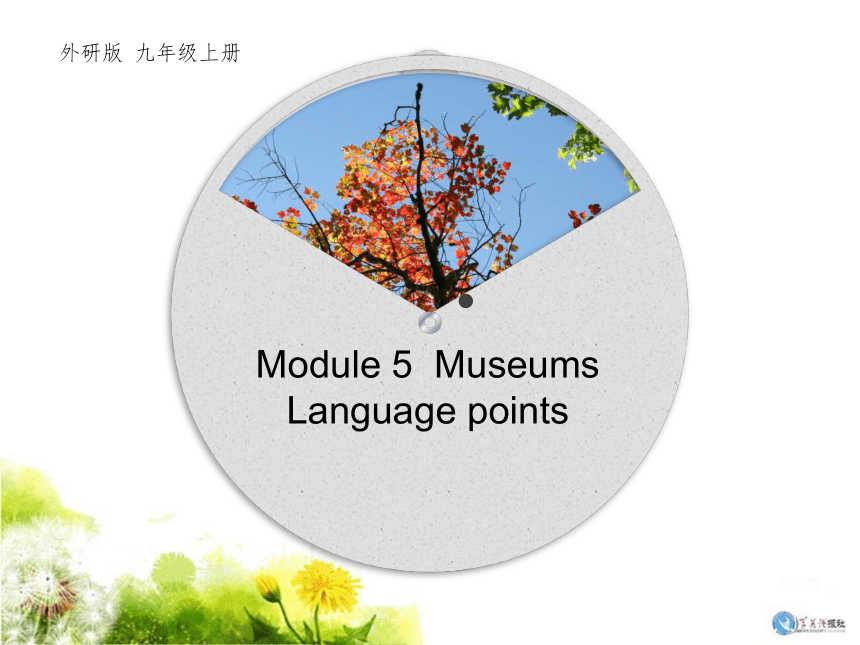
|
|
| 格式 | pptx | ||
| 文件大小 | 630.0KB | ||
| 资源类型 | 教案 | ||
| 版本资源 | 外研版 | ||
| 科目 | 英语 | ||
| 更新时间 | 2022-09-19 17:26:58 | ||
图片预览

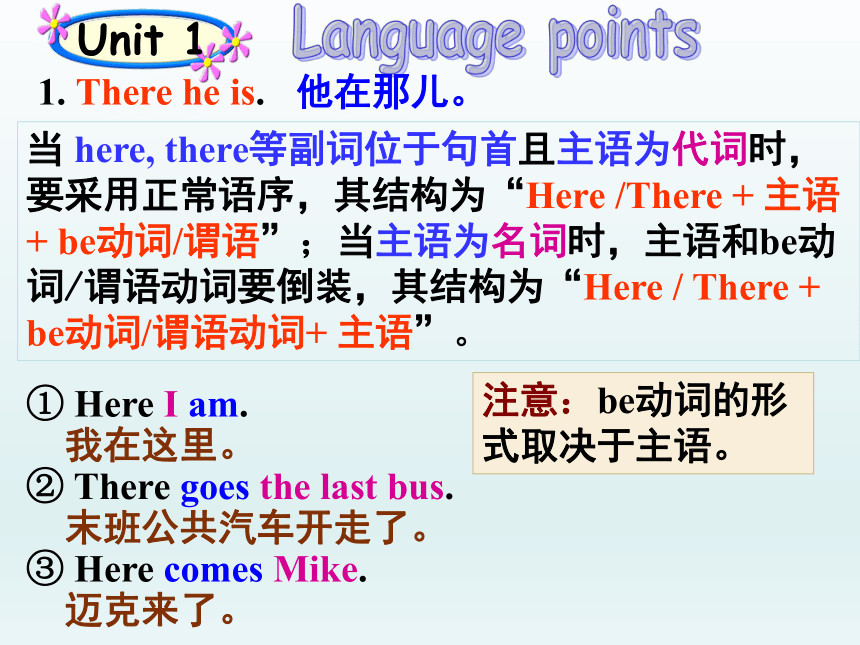
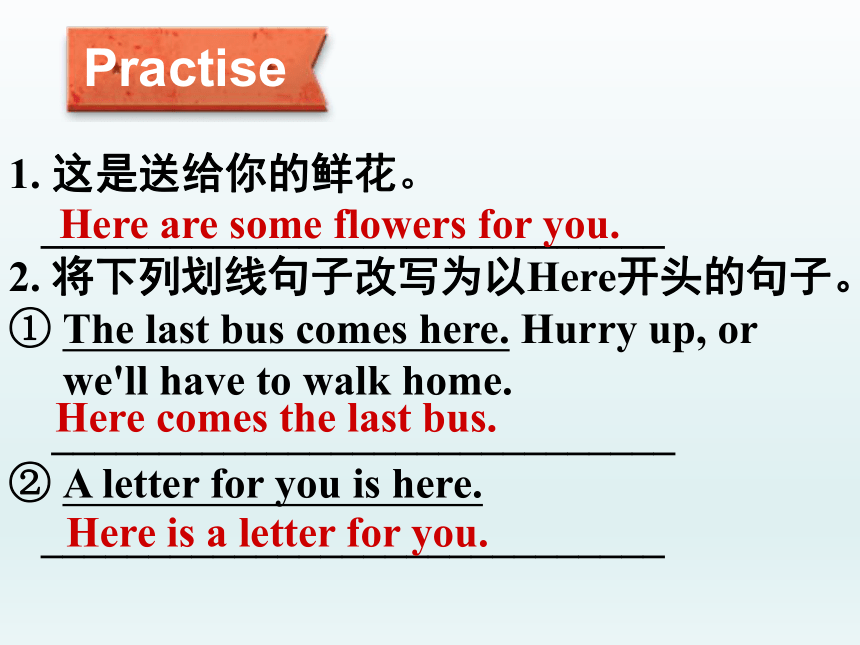

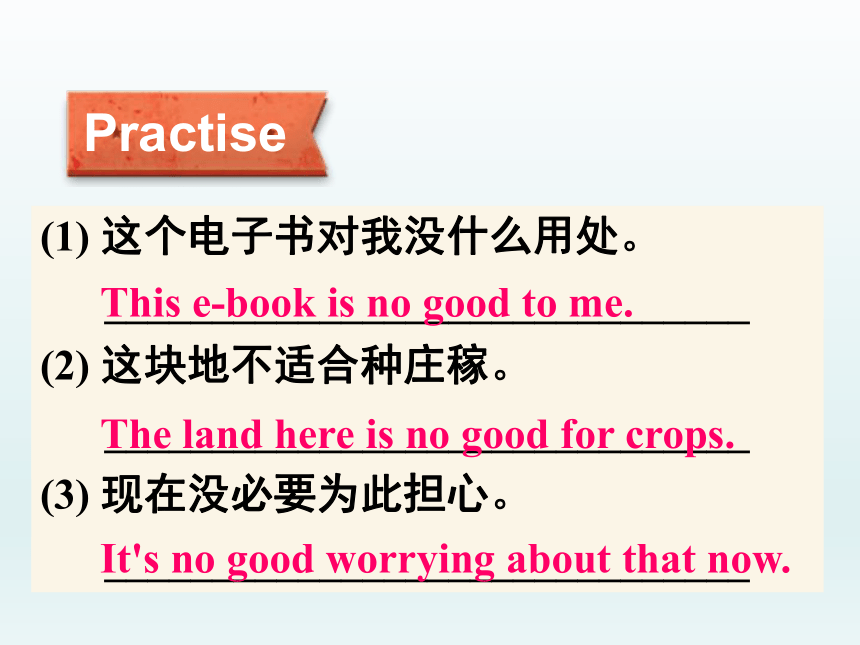


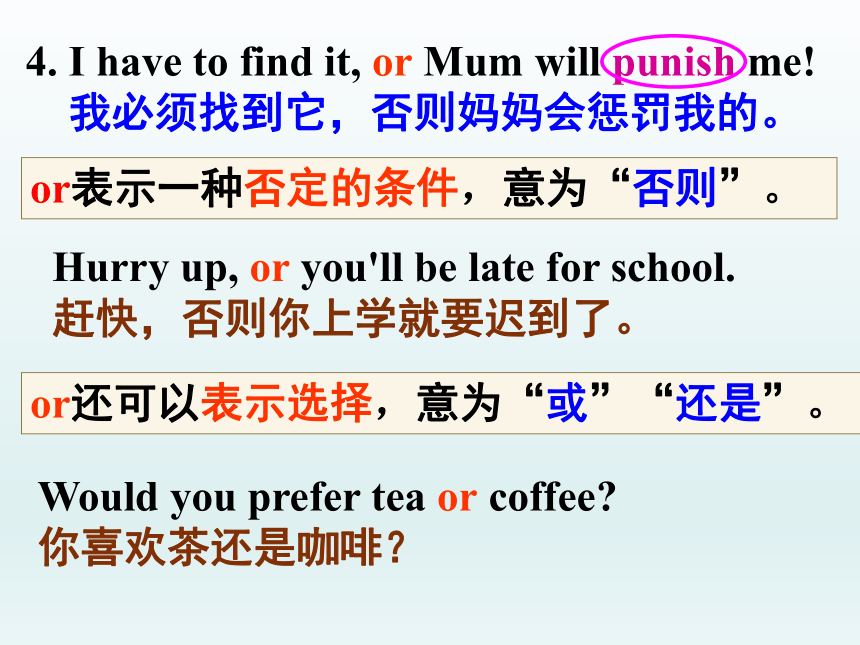
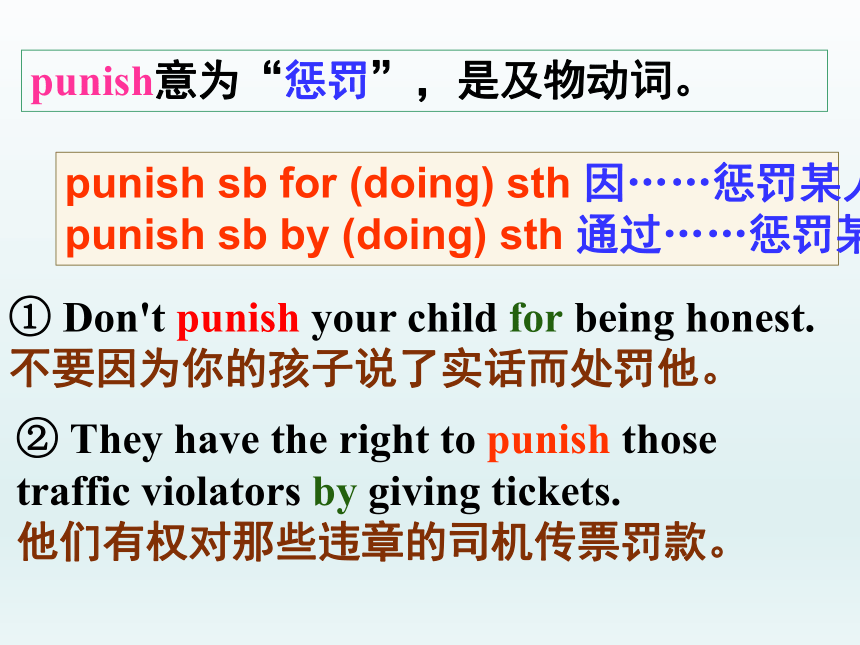
文档简介
(共20张PPT)
外研版 九年级上册
Module 5 Museums
Language points
1. There he is.
① Here I am.
我在这里。
② There goes the last bus.
末班公共汽车开走了。
③ Here comes Mike.
迈克来了。
当 here, there等副词位于句首且主语为代词时,要采用正常语序,其结构为“Here /There + 主语 + be动词/谓语”;当主语为名词时,主语和be动词/谓语动词要倒装,其结构为“Here / There + be动词/谓语动词+ 主语”。
注意:be动词的形式取决于主语。
Unit 1
Language points
他在那儿。
1. 这是送给你的鲜花。
_____________________________
2. 将下列划线句子改写为以Here开头的句子。
① The last bus comes here. Hurry up, or
we'll have to walk home.
_____________________________
② A letter for you is here.
_____________________________
Here are some flowers for you.
Here comes the last bus.
Here is a letter for you.
Practise
2. That's no good.
那样不合适!
① Cars are no good to me, because I can't drive.
汽车对我没多大用处,因为我不会开车。
② It's no good crying now.
现在哭是没用的。
③ This machine is no good for the product.
这台机器不适合做这种产品。
no good意为“不合适的 ”、“没(或没多大)用处(或好处)”。
当表示“对某人没多大用处”时,可用be no good to sb;表示“不适合做某事”时,可用 be no good for sth;表示“做某事没用”时,可用 be no good doing sth。
(1) 这个电子书对我没什么用处。
______________________________
(2) 这块地不适合种庄稼。
______________________________
(3) 现在没必要为此担心。
______________________________
Practise
This e-book is no good to me.
The land here is no good for crops.
It's no good worrying about that now.
3. No wonder the place is empty!
难怪这儿都没有什么人。
no wonder是It's no wonder that的省略形式,意为“难怪……”。
① No wonder he looks so angry.
难怪他看上去如此生气。
② No wonder you're tired, you've been walking for hours.
难怪你累了呢,你一直走了好几个小时。
(1) 难怪你这么沮丧。
______________________________
(2) 难怪地球变得越来越温暖了。
______________________________
______________________________
Translate the following sentences into English.
No wonder you look so upset.
It's no wonder that the earth is becoming warmer and warmer.
Practise
4. I have to find it, or Mum will punish me!
我必须找到它,否则妈妈会惩罚我的。
or还可以表示选择,意为“或”“还是”。
Hurry up, or you'll be late for school.
赶快,否则你上学就要迟到了。
Would you prefer tea or coffee
你喜欢茶还是咖啡?
or表示一种否定的条件,意为“否则”。
punish意为“惩罚”,是及物动词。
① Don't punish your child for being honest.
不要因为你的孩子说了实话而处罚他。
punish sb for (doing) sth 因……惩罚某人
punish sb by (doing) sth 通过……惩罚某人
② They have the right to punish those traffic violators by giving tickets.
他们有权对那些违章的司机传票罚款。
(1)他在那儿。
(2)不合适的、没(或没多大)用处(或好处)
(3)难怪……
(4)否则
(5)惩罚某人
Review
There he is.
no good
no wonder
or
punish sb.
1. …and there are some very noisy machines as well.
这也有一些噪声很大的机器。
as well表示“也”,常用于肯定句中,且位于句末。
① Are they coming as well
他们也来吗?
② I like this movie, and my mother likes it as well.
我喜欢这部电影,我妈妈也很爱看它。
Unit 2
Language points
注意几个“也”的区别:
使用句式 位置
as well 肯定句 常位于句末
also 肯定句(较正式) 句中(be动词,助动词之后,实义动词之前)
too 肯定句(多用于口语) 常位于句末,常用逗号和前面的部分隔开
either 否定句 句末
拓展
用as well, also, too或either完成句子。
1. If he doesn't go, I won't go _______.
2. In this field he has knowledge and experience ________.
3. Simon likes playing football, and he __________ likes playing basketball.
4. He likes swimming, and his wife likes it, ________.
either
as well
also
too
Practise
2. You can learn about communications and the environment as well as maths, physics and chemistry.
as well as连接两个并列成分,意为“不但……而且……”、“除了……之外,还……”。
① She can play tennis as well as basketball.
她不仅会打篮球,还会打网球。
② The teacher, as well as the students, is interested in the activity.
不仅是学生们,老师也对这个活动感兴趣。
你除了可以了解数学、物理、化学,还可以学到通讯、环境方面的知识。
在A as well as B结构中,常常强调的是A项,因此连接两个并列主语时,谓语动词要与A项保持一致。
3. For example, you can find out how people dig coal from the ground and…
① I haven't found anything out about him yet.
我还没有发现有关他的什么情况。
② Can you find out what time the meeting starts
你能查清楚会议什么时候开始吗?
比如,你可以了解人们如何在地下挖煤……
find out意为 “获知、查明 ”,指经过研究、询问或调查后把某事弄清楚,多用于复杂而不容易查出的事情。
用find out或look for的适当形式完成句子:
1. Lucy __________ her keys everywhere, but she didn't find them.
2. To ________ more about the holiday camp, visit our website.
looked for
find out
look for也与 “找”有关,意为 “寻找”,强调过程,指有目的地找。
Practise
拓展
4. …if you want to fill a bag with sand, you have to control a kind of truck on wheels and move it into the correct place.
……如果你想将袋子装满沙子,你得操控一种带轮子的运输车,并把车移动到合适的位置。
fill…with… 用……装满/注满……
① The teacher filled a bottle with water.
老师在瓶子里注满了水。
② He filled the hole with mud.
他用泥土把洞填起来了。
5. If you compare the medicine of the past with the medicine of today…
如果你将过去的医学和现在的医学作比较……
compare…with… : 拿……和……作比较
① Mr Wu likes to compare Class 3 with Class 5.
吴老师喜欢拿三班和五班作比较。
② The teachers are always comparing me with my elder sister.
老师们总是拿我和姐姐作比较。
(1)也
(2)不但……而且……,除了……之外,还……
(3)用……装满/注满……
(4)拿……和……作比较
Review
as well
as well as
fill…with…
compare…with…
THANK YOU!
外研版 九年级上册
Module 5 Museums
Language points
1. There he is.
① Here I am.
我在这里。
② There goes the last bus.
末班公共汽车开走了。
③ Here comes Mike.
迈克来了。
当 here, there等副词位于句首且主语为代词时,要采用正常语序,其结构为“Here /There + 主语 + be动词/谓语”;当主语为名词时,主语和be动词/谓语动词要倒装,其结构为“Here / There + be动词/谓语动词+ 主语”。
注意:be动词的形式取决于主语。
Unit 1
Language points
他在那儿。
1. 这是送给你的鲜花。
_____________________________
2. 将下列划线句子改写为以Here开头的句子。
① The last bus comes here. Hurry up, or
we'll have to walk home.
_____________________________
② A letter for you is here.
_____________________________
Here are some flowers for you.
Here comes the last bus.
Here is a letter for you.
Practise
2. That's no good.
那样不合适!
① Cars are no good to me, because I can't drive.
汽车对我没多大用处,因为我不会开车。
② It's no good crying now.
现在哭是没用的。
③ This machine is no good for the product.
这台机器不适合做这种产品。
no good意为“不合适的 ”、“没(或没多大)用处(或好处)”。
当表示“对某人没多大用处”时,可用be no good to sb;表示“不适合做某事”时,可用 be no good for sth;表示“做某事没用”时,可用 be no good doing sth。
(1) 这个电子书对我没什么用处。
______________________________
(2) 这块地不适合种庄稼。
______________________________
(3) 现在没必要为此担心。
______________________________
Practise
This e-book is no good to me.
The land here is no good for crops.
It's no good worrying about that now.
3. No wonder the place is empty!
难怪这儿都没有什么人。
no wonder是It's no wonder that的省略形式,意为“难怪……”。
① No wonder he looks so angry.
难怪他看上去如此生气。
② No wonder you're tired, you've been walking for hours.
难怪你累了呢,你一直走了好几个小时。
(1) 难怪你这么沮丧。
______________________________
(2) 难怪地球变得越来越温暖了。
______________________________
______________________________
Translate the following sentences into English.
No wonder you look so upset.
It's no wonder that the earth is becoming warmer and warmer.
Practise
4. I have to find it, or Mum will punish me!
我必须找到它,否则妈妈会惩罚我的。
or还可以表示选择,意为“或”“还是”。
Hurry up, or you'll be late for school.
赶快,否则你上学就要迟到了。
Would you prefer tea or coffee
你喜欢茶还是咖啡?
or表示一种否定的条件,意为“否则”。
punish意为“惩罚”,是及物动词。
① Don't punish your child for being honest.
不要因为你的孩子说了实话而处罚他。
punish sb for (doing) sth 因……惩罚某人
punish sb by (doing) sth 通过……惩罚某人
② They have the right to punish those traffic violators by giving tickets.
他们有权对那些违章的司机传票罚款。
(1)他在那儿。
(2)不合适的、没(或没多大)用处(或好处)
(3)难怪……
(4)否则
(5)惩罚某人
Review
There he is.
no good
no wonder
or
punish sb.
1. …and there are some very noisy machines as well.
这也有一些噪声很大的机器。
as well表示“也”,常用于肯定句中,且位于句末。
① Are they coming as well
他们也来吗?
② I like this movie, and my mother likes it as well.
我喜欢这部电影,我妈妈也很爱看它。
Unit 2
Language points
注意几个“也”的区别:
使用句式 位置
as well 肯定句 常位于句末
also 肯定句(较正式) 句中(be动词,助动词之后,实义动词之前)
too 肯定句(多用于口语) 常位于句末,常用逗号和前面的部分隔开
either 否定句 句末
拓展
用as well, also, too或either完成句子。
1. If he doesn't go, I won't go _______.
2. In this field he has knowledge and experience ________.
3. Simon likes playing football, and he __________ likes playing basketball.
4. He likes swimming, and his wife likes it, ________.
either
as well
also
too
Practise
2. You can learn about communications and the environment as well as maths, physics and chemistry.
as well as连接两个并列成分,意为“不但……而且……”、“除了……之外,还……”。
① She can play tennis as well as basketball.
她不仅会打篮球,还会打网球。
② The teacher, as well as the students, is interested in the activity.
不仅是学生们,老师也对这个活动感兴趣。
你除了可以了解数学、物理、化学,还可以学到通讯、环境方面的知识。
在A as well as B结构中,常常强调的是A项,因此连接两个并列主语时,谓语动词要与A项保持一致。
3. For example, you can find out how people dig coal from the ground and…
① I haven't found anything out about him yet.
我还没有发现有关他的什么情况。
② Can you find out what time the meeting starts
你能查清楚会议什么时候开始吗?
比如,你可以了解人们如何在地下挖煤……
find out意为 “获知、查明 ”,指经过研究、询问或调查后把某事弄清楚,多用于复杂而不容易查出的事情。
用find out或look for的适当形式完成句子:
1. Lucy __________ her keys everywhere, but she didn't find them.
2. To ________ more about the holiday camp, visit our website.
looked for
find out
look for也与 “找”有关,意为 “寻找”,强调过程,指有目的地找。
Practise
拓展
4. …if you want to fill a bag with sand, you have to control a kind of truck on wheels and move it into the correct place.
……如果你想将袋子装满沙子,你得操控一种带轮子的运输车,并把车移动到合适的位置。
fill…with… 用……装满/注满……
① The teacher filled a bottle with water.
老师在瓶子里注满了水。
② He filled the hole with mud.
他用泥土把洞填起来了。
5. If you compare the medicine of the past with the medicine of today…
如果你将过去的医学和现在的医学作比较……
compare…with… : 拿……和……作比较
① Mr Wu likes to compare Class 3 with Class 5.
吴老师喜欢拿三班和五班作比较。
② The teachers are always comparing me with my elder sister.
老师们总是拿我和姐姐作比较。
(1)也
(2)不但……而且……,除了……之外,还……
(3)用……装满/注满……
(4)拿……和……作比较
Review
as well
as well as
fill…with…
compare…with…
THANK YOU!
同课章节目录
- Module 1 Wonders of the world
- Unit 1 It's more than 2,000 years old.
- Unit 2 The Grand Canyon was not just big.
- Unit 3 Language in use
- Module 2 Public holidays
- Unit 1 My family always go somewhere interesting a
- Unit 2 We have celebrated the festival since the f
- Unit 3 Language in use
- Module 3 Heroes
- Unit 1 She trained hard,so she became a great play
- Unit 2There were few doctors, so he had to work ve
- Unit 3 Language in use
- Module 4 Home alone
- Unit 1 I can look after myself, although it won’t
- Unit 2 I became so bored with their orders that I
- Unit 3 Language in use
- Module 5 Museums
- Unit 1 Don't cross that rope!
- Unit 2 If you ever go to London, make sure you vis
- Unit 3 Language in use
- Module 6 Problems
- Unit 1 If I start after dinner, I'll finish it be
- Unit 2 If you tell him the truth now, you will sho
- Unit 3 Language in use
- Revision Module A
- Module 7 Great books
- Unit 1 We're still influenced by Confucius's idea
- Unit 2 It is still read and loved.
- Unit 3 Language in use
- Module 8 Sports life
- Unit 1 Daming wasn't chosen for the team last time
- Unit 2 He was invited to competitions around the w
- Unit 3 Language in use
- Module 9 Great inventions
- Unit 1 Will computers be used more than books in t
- Unit 2 Will books be replaced by the Internet?
- Unit 3 Language in use
- Module 10 Australia
- Unit 1 I have some photos that I took in Australia
- Unit 2 The game that they like most is Australian
- Unit 3 Language in use
- Module 11 Photos
- Unit 1 He's the boy who won the photo competition
- Unit 2 The photo which we liked best was taken by
- Unit 3 Language in use
- Module 12 Save our world
- Unit 1 If everyone starts to do something, the wor
- Unit 2 Repeat these three words daily: reduce, reu
- Unit 3 Language in use
- Revision Module B
